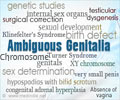Frequency of disorders of sexual development is higher when compared to previous studies among newborns, according to a new research.

TOP INSIGHT
Early placental dysfunction, androgen deficiency, low birth weight could play an important role in the etiology of genital anomalies among newborns. Irrespective of the cause, timely treatment is the need of the hour.
Read More..
"Our research found 18 babies with ambiguous genitalia among 14,177 newborns (1.3 in 1,000 births). This frequency is higher when compared to previous studies (1 in 4,500-5,500)," said the study's first author, Banu Kucukemre Aydin, M.D., of Istanbul University in Turkey. "Many previous studies used registries with a low capture rate, but our study was done prospectively. Also, most of the published data is coming from Western countries in which consanguinity rates are lower than our country."
In the prospective study, researchers examined 14,177 newborns and found 18 of them had ambiguous genitalia. Fifteen newborns were diagnosed with 46,XY DSD, which occurs in male infants when the body can't use testosterone properly or the testicles do not develop properly. Birth weight was lower in babies with 46, XY DSD than healthy babies, and preeclampsia was a common condition in those pregnancies.
"These findings support the hypothesis that early placental dysfunction and androgen deficiency might be important in the etiology of male genital anomalies," Aydin said.
Other authors of the study include: Nurcin Saka, Firdevs Bas, Sukran Yildirim, Feyza Darendeliler, and Asuman Coban of Istanbul University; Evrim Kiray Bas of the Sisli Etfal Training and Research Hospital in Turkey; and Tulay Guran of the Zeynep Kamil Women's and Children's Hospital and the Marmara University in Istanbul, Turkey.
The study, "Frequency of Ambiguous Genitalia in 14,177 Newborns in Turkey," will be published online.
Source-Eurekalert
 MEDINDIA
MEDINDIA

 Email
Email





